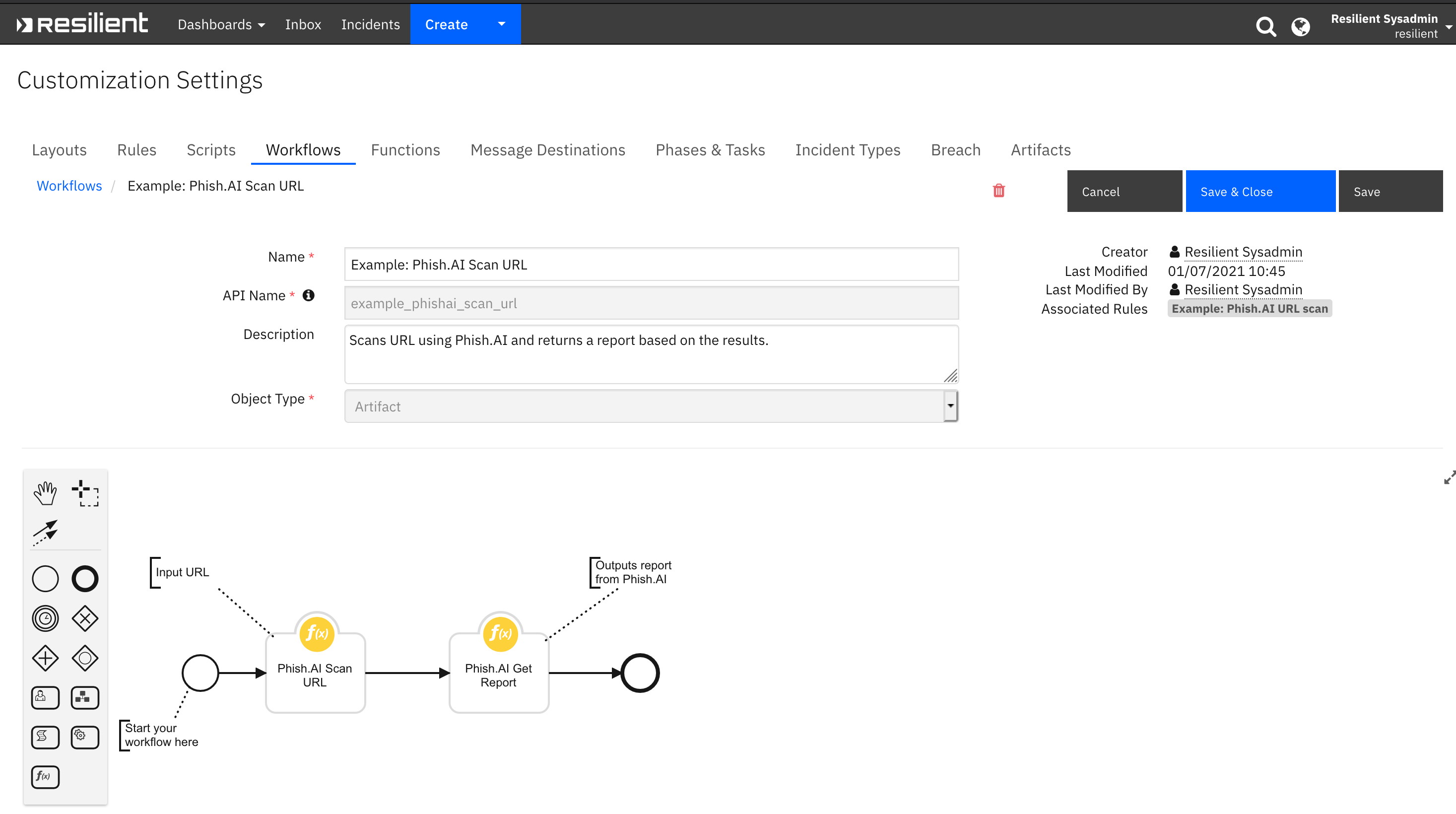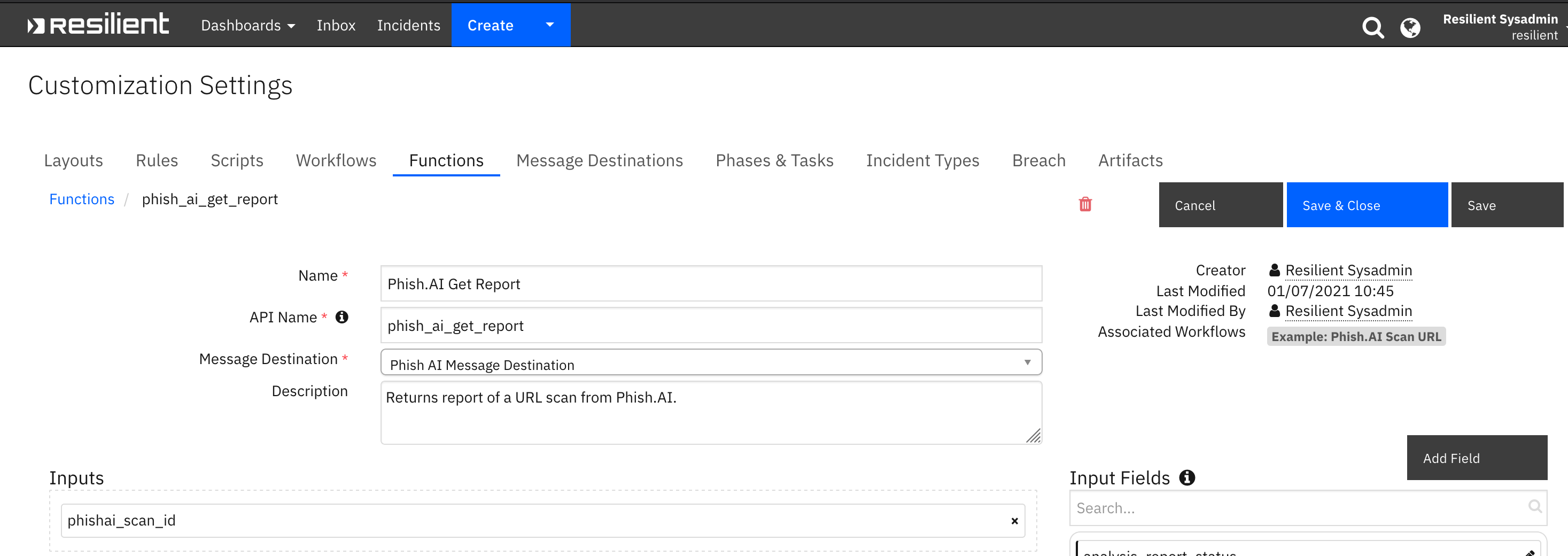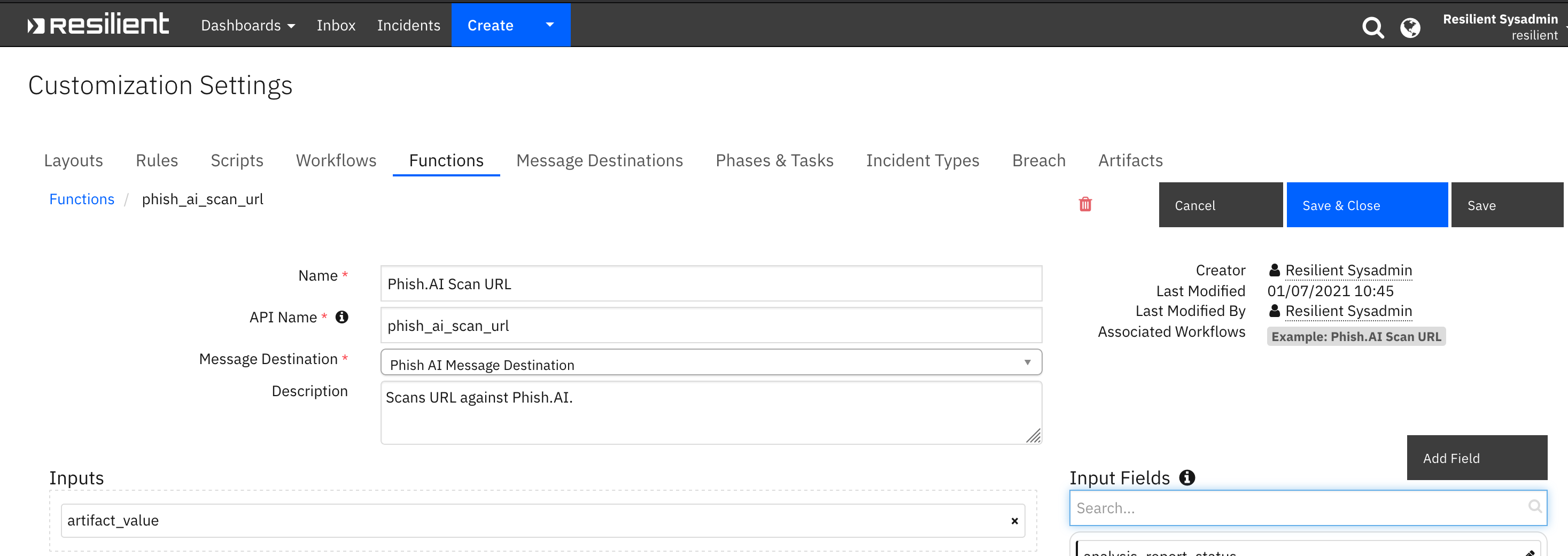Phish.AI¶
Table of Contents¶
Release Notes¶
Version |
Date |
Notes |
|---|---|---|
1.0.0 |
1/2021 |
AppHost support |
1.0.0 |
2/2018 |
Initial Release |
Overview¶
Resilient Circuits Components for ‘fn_phish_ai’

Resilient Circuits Components for ‘fn_phish_ai’
Key Features¶
This package contains two functions that scan urls and retrieve reports from Phish.AI.
An example rule and workflow are included that show how to scan a URL artifact and write Phish.AI results to an incident note.
Requirements¶
This app supports the IBM Resilient SOAR Platform and the IBM Cloud Pak for Security.
Resilient platform¶
The Resilient platform supports two app deployment mechanisms, App Host and integration server.
If deploying to a Resilient platform with an App Host, the requirements are:
Resilient platform >=
36.0.5634.The app is in a container-based format (available from the AppExchange as a
zipfile).
If deploying to a Resilient platform with an integration server, the requirements are:
Resilient platform >=
36.0.5634.The app is in the older integration format (available from the AppExchange as a
zipfile which contains atar.gzfile).Integration server is running
resilient_circuits>=30.0.0.If using an API key account, make sure the account provides the following minimum permissions:
Name
Permissions
Org Data
Read
Function
Read
The following Resilient platform guides provide additional information:
App Host Deployment Guide: provides installation, configuration, and troubleshooting information, including proxy server settings.
Integration Server Guide: provides installation, configuration, and troubleshooting information, including proxy server settings.
System Administrator Guide: provides the procedure to install, configure and deploy apps.
The above guides are available on the IBM Knowledge Center at ibm.biz/resilient-docs. On this web page, select your Resilient platform version. On the follow-on page, you can find the App Host Deployment Guide or Integration Server Guide by expanding Resilient Apps in the Table of Contents pane. The System Administrator Guide is available by expanding System Administrator.
Cloud Pak for Security¶
If you are deploying to IBM Cloud Pak for Security, the requirements are:
IBM Cloud Pak for Security >= 1.4.
Cloud Pak is configured with an App Host.
The app is in a container-based format (available from the AppExchange as a
zipfile).
The following Cloud Pak guides provide additional information:
App Host Deployment Guide: provides installation, configuration, and troubleshooting information, including proxy server settings. From the Table of Contents, select Case Management and Orchestration & Automation > Orchestration and Automation Apps.
System Administrator Guide: provides information to install, configure, and deploy apps. From the IBM Cloud Pak for Security Knowledge Center table of contents, select Case Management and Orchestration & Automation > System administrator.
These guides are available on the IBM Knowledge Center at ibm.biz/cp4s-docs. From this web page, select your IBM Cloud Pak for Security version. From the version-specific Knowledge Center page, select Case Management and Orchestration & Automation.
Proxy Server¶
The app does support a proxy server.
Installation¶
Install¶
To install or uninstall an App or Integration on the Resilient platform, see the documentation at ibm.biz/resilient-docs.
To install or uninstall an App on IBM Cloud Pak for Security, see the documentation at ibm.biz/cp4s-docs and follow the instructions above to navigate to Orchestration and Automation.
App Configuration¶
The following table provides the settings you need to configure the app. These settings are made in the app.config file. See the documentation discussed in the Requirements section for the procedure.
Config |
Required |
Example |
Description |
|---|---|---|---|
phishai_api_key |
yes |
xxx |
Phish.AI API Key |
timeout_seconds |
no |
60 |
Time to return report in seconds |
Function - Phish.AI Get Report¶
Returns report of a URL scan from Phish.AI.

Inputs:
Name |
Type |
Required |
Example |
Tooltip |
|---|---|---|---|---|
|
|
No |
|
- |
Outputs:
results = {
"content":{
"status":"completed",
"domain":"startup417.gb.net",
"user_agent":"Mozilla/5.0 (X11; Linux x86_64) AppleWebKit/537.36 (KHTML, like Gecko) Chrome/64.0.3282.140 Safari/537.36",
"target":"Microsoft",
"title":"sign_in_to_your_microsoft_account",
"url":"https://startup417.gb.net/M3?mes1=asdf@asdf.com",
"time":"2018-12-06T22:39:34.210Z",
"verdict":"malicious",
"plan":"free",
"tld":"net",
"iso_code":"US",
"first_seen":"2018-12-06T19:16:20.825Z",
"ip_address":"104.24.104.116",
"asn":13335,
"user_email":"api",
"user":"free-api"
},
"inputs":{
"phishai_scan_id":"gGBSaVvlN5qc5PcwvnuT"
},
"run_time":"0.419372797012"
}
Example Pre-Process Script:
inputs.phishai_scan_id = workflow.properties.phishai_scan_output["content"]["scan_id"]
Example Post-Process Script:
if results.content:
note = "Phish.AI url: " + results.content.url
note = note + "<br/>Phish.AI verdict: " + results.content.verdict
note = note + "<br/><a href=\"https://app.phish.ai/incident/{}\">Phish.AI report link</a>".format(results.inputs.phishai_scan_id)
incident.addNote(helper.createRichText(note))
"""
Example Response
{
"content":{
"status":"completed",
"domain":"startup417.gb.net",
"user_agent":"Mozilla/5.0 (X11; Linux x86_64) AppleWebKit/537.36 (KHTML, like Gecko) Chrome/64.0.3282.140 Safari/537.36",
"target":"Microsoft",
"title":"sign_in_to_your_microsoft_account",
"url":"https://startup417.gb.net/M3?mes1=asdf@asdf.com",
"time":"2018-12-06T22:39:34.210Z",
"verdict":"malicious",
"plan":"free",
"tld":"net",
"iso_code":"US",
"first_seen":"2018-12-06T19:16:20.825Z",
"ip_address":"104.24.104.116",
"asn":13335,
"user_email":"api",
"user":"free-api"
},
"inputs":{
"phishai_scan_id":"gGBSaVvlN5qc5PcwvnuT"
},
"run_time":"0.419372797012"
}
"""
Function - Phish.AI Scan URL¶
Scans URL against Phish.AI.

Inputs:
Name |
Type |
Required |
Example |
Tooltip |
|---|---|---|---|---|
|
|
No |
|
- |
Outputs:
results = {
"content":{
"url":"https://startup417.gb.net/M3?mes1=asdf@asdf.com",
"scan_id":"gGBSaVvlN5qc5PcwvnuT"
},
"inputs":{
"artifact_value":"https://startup417.gb.net/M3?mes1=asdf@asdf.com"
},
"run_time":"0.446181058884"
}
Example Pre-Process Script:
inputs.artifact_value = artifact.value
Example Post-Process Script:
"""
Example response
{
"content":{
"url":"https://startup417.gb.net/M3?mes1=asdf@asdf.com",
"scan_id":"gGBSaVvlN5qc5PcwvnuT"
},
"inputs":{
"artifact_value":"https://startup417.gb.net/M3?mes1=asdf@asdf.com"
},
"run_time":"0.446181058884"
}
"""
Rules¶
Rule Name |
Object |
Workflow Triggered |
|---|---|---|
Example: Phish.AI URL scan |
artifact |
|
Troubleshooting & Support¶
Refer to the documentation listed in the Requirements section for troubleshooting information.
For Support¶
This is a IBM Community provided App. Please search the Community https://ibm.biz/resilientcommunity for assistance.